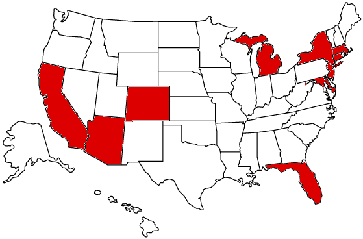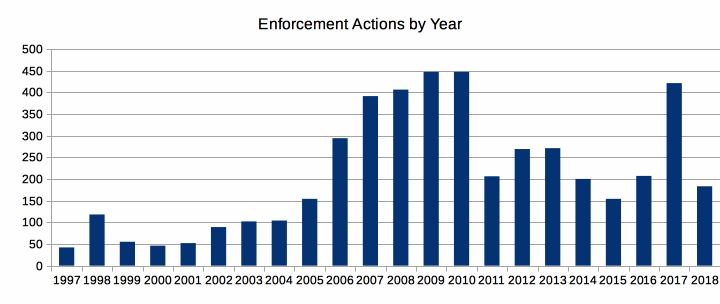There are still a few pirate radio enforcement-cases from 2017 that the FCC has yet to release, but by and large the numbers from last year are in and they most definitely show an uptick in the number of enforcement actions against unlicensed broadcasters. As of today, there were 383 enforcement-actions across 18 states, compared to 207 actions in 2016 covering just nine states. For the second year running, Florida tops the list of states with the most anti-pirate enforcement, followed by Massachusetts and New York.
 2017 ranks as the fifth-busiest year for enforcement activity in the 20-year history of the Enforcement Action Database, eclipsed only by a tear the FCC’s Enforcement Bureau went on during the end of President Bush II’s second term and Obama’s first term, when a proposed expansion of LPFM was being debated. Of the activity logged last year, the vast majority were station-visits (201, or 52%) or Notices of Unlicensed Operation (aka warning letters, 168, or 44%). The remaining 4% of enforcement actions included Notices of Apparent Liability (aka pre-fines, of which there were four) and Forfeiture Orders (nine).
2017 ranks as the fifth-busiest year for enforcement activity in the 20-year history of the Enforcement Action Database, eclipsed only by a tear the FCC’s Enforcement Bureau went on during the end of President Bush II’s second term and Obama’s first term, when a proposed expansion of LPFM was being debated. Of the activity logged last year, the vast majority were station-visits (201, or 52%) or Notices of Unlicensed Operation (aka warning letters, 168, or 44%). The remaining 4% of enforcement actions included Notices of Apparent Liability (aka pre-fines, of which there were four) and Forfeiture Orders (nine).
In 2016, the FCC’s Enforcement Bureau issued nine NALs and five Forfeiture Orders, so on balance there’s no real movement or improvement in the agency’s escalation-protocol beyond initial contact(s). Continue reading “Paper Tiger Roars in 2017 – To What End?”
Tag: enforcement action database
FCC and Pirates: Going Through the Motions Faster
Signifying what the industry trades call a “crackdown” and added “pressure” on unlicensed broadcasters, the FCC’s Enforcment Bureau has stepped up its issuance of warning-letters, primarily to pirate stations in New York and New Jersey. Of the 94 enforcement actions against unlicensed broadcasters this year, 52 of them have taken place in these two states. Enforcement activity also includes two Notices of Apparent Liability and seven Forfeiture Orders, for cases that originated in 2015-16. Overall, however, the pace of enforcement actions is running behind the totals of a year ago.
This is not necessarily an expansion of enforcement duties. NYC-based field agents especially are now doing what they call “follow-up investigations” – in a nutshell, agents now re-visit unlicensed stations they’ve already contacted. If they are still on the air, they issue yet another warning letter to the operator (or, in the case of one New Jersey-based pirate, to the owner of the property where the station is housed, who was not in on the first-round contact). “Follow-up investigations” typically occur within 1-3 months of initial contact with the offending station. But if stations aren’t fazed by the first FCC nastygram they get, what are the odds the second one will change their ways? Continue reading “FCC and Pirates: Going Through the Motions Faster”
FCC and Pirates: A War of Words
The rhetoric’s heated up, for sure. Commissioner Mike O’Rielly, who’s made cracking down on unlicensed stations one of his signature issues, calls them infectious squatters, casting the phenomenon as a cancer preparing to metastisize. And he’s gotten much more critical about his own agency’s handling of the problem: when the FCC proposed to fine a Kentucky couple more than $144,000 last month for operating a low-power TV station for nearly twenty years after its original license had expired, he likened FCC enforcement to “a sometimes annoying, sometimes sleepy, but ultimately harmless Chihuahua when it came to protecting broadcast spectrum licenses.”
That makes “paper tiger” sound almost tame.
Industry trade-press has taken the cue and upped their coverage of the FCC’s anti-pirate broadcast enforcement. Radio World trumpets warning lettters, fines, and threats of fines issued by the Enforcement Bureau as if they’re landing knockout blows. It even got Chairman Ajit Pai to concede in a March interview that pirates are a “serious concern.” Continue reading “FCC and Pirates: A War of Words”
O'Rielly Outlines Anti-Pirate Agenda for 2016
Speaking at the Country Radio Seminar last week, FCC Commissioner Mike O’Rielly laid out several items he’d like to make part of radio’s regulatory agenda this year. And true to form, the man who’s made pirate radio a personal crusade has big plans to try and wipe out what he calls “poison ivy in the garden of the radio spectrum.”
O’Rielly acknowledged that the largest concentrations of unlicensed broadcasters are in America’s cities, such as New York, Boston, and Miami, but claims that “the problem is expanding rapidly,” and it represents “an attack on the integrity of our airwaves – an attack that must be confronted and defeated on no uncertain terms, lest it continue to push forward.” Continue reading “O'Rielly Outlines Anti-Pirate Agenda for 2016”
In Face of Downsizing, Are FCC Agents Pulling Back?
Can’t say for sure, but the latest update to the Enforcement Action Database seems to suggest it, as the agency considers drastically cutting their already meager ranks. As of the end of April, there’ve been just 35 enforcement actions against 17 stations in four states. There has been no official report of field activity in May. In 2014, there were 52 enforcement actions in the same time-frame.
 2014 saw the lowest level of FCC enforcement activity against unlicensed broadcasters in nearly a decade. Where agents are active, New York continues to lead the way, followed by New Jersey and California. A station in Colorado also got a warning letter this year, but that was a follow-up to a visit last year. Continue reading “In Face of Downsizing, Are FCC Agents Pulling Back?”
2014 saw the lowest level of FCC enforcement activity against unlicensed broadcasters in nearly a decade. Where agents are active, New York continues to lead the way, followed by New Jersey and California. A station in Colorado also got a warning letter this year, but that was a follow-up to a visit last year. Continue reading “In Face of Downsizing, Are FCC Agents Pulling Back?”
FCC Enforcement: On the Wane?
Just got the Enforcement Action Database caught up for the year, and the numbers show that FCC field activity is running at the lowest level it’s been since 2005. Just 173 enforcement actions to date, as opposed to ~260 at this time last year.
There was a similar dip in the years afer the FCC first proposed the creation of LPFM, and with LPFM’s second wave in the works it’s enticing to see a correlation, but this time around I’m more inclined to believe it has to do with changing political priorities regarding enforcement policy (pirates take a back seat to cell-phone jammers, for example) coupled with the effects of austerity on federal government services more broadly. Continue reading “FCC Enforcement: On the Wane?”
FCC Enforcement: Questionably Redundant and Retributive
Two-thirds of 2012 is in the can, and the FCC seems to be adhering to its “new normal” when it comes to pirate radio enforcement. Field agents have conducted 183 enforcement actions as of the end of August – this is up from the 132 actions logged by this time a year ago, but well off the year-over-year record-breaking enforcement pace set between 2006 and 2010.
The FCC’s been involved in anti-pirate enforcement activity in 15 states and Puerto Rico so far this year, as opposed to more than two dozen states by this point in 2011. The hottest spots continue to be the New York metropolitan area as well as the state of Florida more generally. Continue reading “FCC Enforcement: Questionably Redundant and Retributive”
FCC Enforcement: Check, Please!
It’s been an active spring for field agents in the FCC’s Enforcement Bureau, but the agency’s pirate-hunting fervor still seems tempered. The present pace of this year’s activity mirrors 2011 – good news of a sort, because last year saw a massive drop-off in enforcement action.
That said, about four dozen pirate stations in 13 states (and Puerto Rico) have had some sort of contact with the federales this year. Although the FCC’s enforcement protocol remains firmly in the administrative realm, there have been some interesting developments this year. Continue reading “FCC Enforcement: Check, Please!”
Anti-Pirate Enforcement Plummets in 2011
The austerity gripping the United States caught up with the FCC’s Enforcement Bureau last year, as field activity against unlicensed broadcasters dropped dramatically – to a level not seen in six years.
 From a record high of 447 enforcement actions clocked in 2009 and 2010, field agents executed just 184 in 2011, against fewer than 100 stations total. Massive drops were seen in the number of station-visits and warning letters issued. Continue reading “Anti-Pirate Enforcement Plummets in 2011”
From a record high of 447 enforcement actions clocked in 2009 and 2010, field agents executed just 184 in 2011, against fewer than 100 stations total. Massive drops were seen in the number of station-visits and warning letters issued. Continue reading “Anti-Pirate Enforcement Plummets in 2011”
FCC Enforcement: Shortwave on Radar?
The Enforcement Action Database continues to show a relatively lackadaisical year of pirate-hunting shaping up: just 35 actions through mid-April.
Should the trend continue, enforcement activity against unlicensed broadcasters may approach levels not seen since 2005-06, the start of the FCC’s post-LPFM station-hunting campaign. This would signify a significant shift and could be indicative of strategic revisions involving the agency’s spectrum enforcement priorities more generally. Continue reading “FCC Enforcement: Shortwave on Radar?”